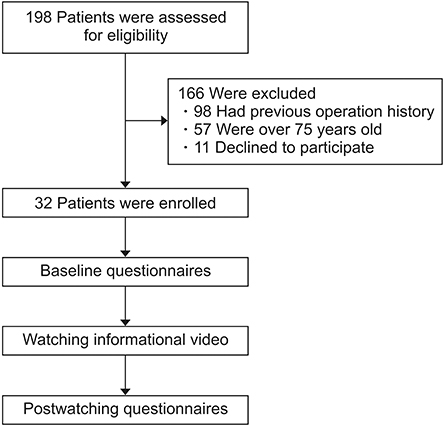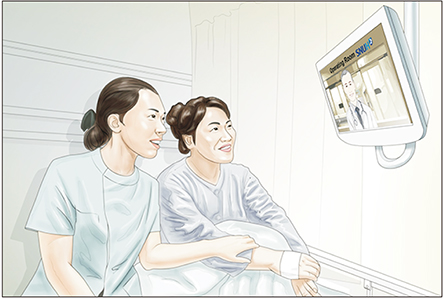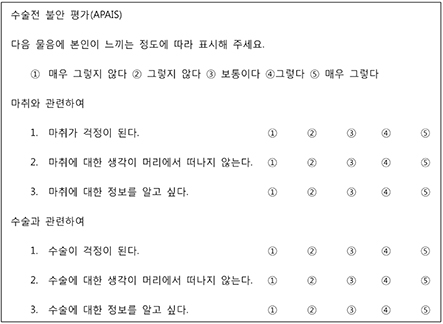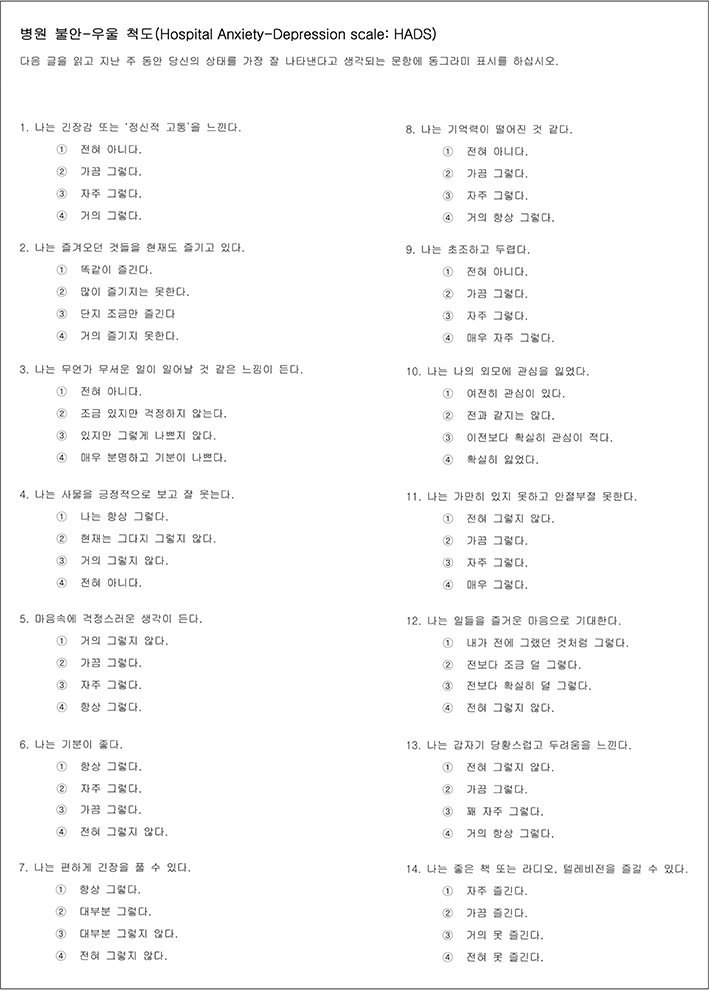Ann Surg Treat Res.
2019 Jun;96(6):290-295. 10.4174/astr.2019.96.6.290.
Effects of an Internet-based informational video on preoperative anxiety in patients with colorectal cancer
- Affiliations
-
- 1Department of Surgery, Chungbuk National University Hospital, Cheongju, Korea.
- 2Department of Surgery, Seoul National University Bundang Hospital, Seongnam, Korea. crsohk@gmail.com
- 3Department of Anesthesiology and Pain Medicine, Seoul National University Bundang Hospital, Seongnam, Korea.
- 4Division of Statistics, Medical Research Collaborating Center, Seoul National University Bundang Hospital, Seongnam, Korea.
- KMID: 2447953
- DOI: http://doi.org/10.4174/astr.2019.96.6.290
Abstract
- PURPOSE
Surgery is the primary curative treatment for colorectal cancer; however, it remains a frightening procedure that can cause stress and pain in affected patients. Therefore, patients typically experience significant anxiety during the preoperative period, which has been associated with poorer outcome after surgery. This study aimed to evaluate the effect of an Internet-based informational video on preoperative anxiety level in patients with colorectal cancer.
METHODS
This prospective, single-arm, observational study included patients scheduled to undergo elective colorectal cancer surgery, who did not have a history of previous surgery or major cognitive impairment. The primary outcome measure was the change in Amsterdam Preoperative Anxiety and Information Scale - Anxiety (APAIS-A) before and after watching a 5-min informational video (https://youtu.be/VzhtOMPUe4Q) during the preoperative period. Secondary outcome measures were the change in Hospital Anxiety and Depression Scale (HADS), length of postoperative hospital day, and postoperative morbidity.
RESULTS
Thirty-two patients were enrolled. Anxiety was significantly decreased after watching the video (APAIS-A score: from 10.8 ± 3.7 to 8.2 ± 3.2, P < 0.001, mean reduction: 22.2%). HADS score was also significantly decreased (from 5.8 ± 4.4 to 4.0 ± 3.3, P = 0.001, mean reduction: 26.5%). All preoperative anxiety level did not significantly differ between patients who developed postoperative complication and those who did not.
CONCLUSION
The informational video was an effective tool to reduce preoperative anxiety. Viewing this video may confer a higher level of confidence and realistic expectations, as well as reducing patients' preoperative anxiety.
Keyword
MeSH Terms
Figure
Reference
-
1. Siegel R, Naishadham D, Jemal A. Cancer statistics, 2012. CA Cancer J Clin. 2012; 62:10–29.
Article2. Shin A, Kim KZ, Jung KW, Park S, Won YJ, Kim J, et al. Increasing trend of colorectal cancer incidence in Korea, 1999–2009. Cancer Res Treat. 2012; 44:219–226.
Article3. Tsunoda A, Nakao K, Hiratsuka K, Yasuda N, Shibusawa M, Kusano M. Anxiety, depression and quality of life in colorectal cancer patients. Int J Clin Oncol. 2005; 10:411–417.
Article4. Grieve RJ. Day surgery preoperative anxiety reduction and coping strategies. Br J Nurs. 2002; 11:670–678.
Article5. Pritchard MJ. Identifying and assessing anxiety in pre-operative patients. Nurs Stand. 2009; 23:35–40.
Article6. Jlala HA, French JL, Foxall GL, Hardman JG, Bedforth NM. Effect of preoperative multimedia information on perioperative anxiety in patients undergoing procedures under regional anaesthesia. Br J Anaesth. 2010; 104:369–374.
Article7. Norris W, Baird WL. Pre-operative anxiety: a study of the incidence and aetiology. Br J Anaesth. 1967; 39:503–509.
Article8. Shevde K, Panagopoulos G. A survey of 800 patients' knowledge, attitudes, and concerns regarding anesthesia. Anesth Analg. 1991; 73:190–198.
Article9. Williams JG, Jones JR. Psychophysiological responses to anesthesia and operation. JAMA. 1968; 203:415–417.
Article10. Goldmann L, Ogg TW, Levey AB. Hypnosis and daycase anaesthesia. A study to reduce pre-operative anxiety and intraoperative anaesthetic requirements. Anaesthesia. 1988; 43:466–469.11. Ip HY, Abrishami A, Peng PW, Wong J, Chung F. Predictors of postoperative pain and analgesic consumption: a qualitative systematic review. Anesthesiology. 2009; 111:657–677.12. Lee A, Chui PT, Gin T. Educating patients about anesthesia: a systematic review of randomized controlled trials of mediabased interventions. Anesth Analg. 2003; 96:1424–1431.
Article13. Pearson S, Maddern GJ, Hewett P. Interacting effects of preoperative information and patient choice in adaptation to colonoscopy. Dis Colon Rectum. 2005; 48:2047–2054.
Article14. O'Connor MI, Brennan K, Kazmerchak S, Pratt J. YouTube videos to create a “virtual hospital experience” for hip and knee replacement patients to decrease preoperative anxiety: a randomized trial. Interact J Med Res. 2016; 5:e10.15. Tou S, Tou W, Mah D, Karatassas A, Hewett P. Effect of preoperative two-dimensional animation information on perioperative anxiety and knowledge retention in patients undergoing bowel surgery: a randomized pilot study. Colorectal Dis. 2013; 15:e256–e265.
Article16. Salzwedel C, Petersen C, Blanc I, Koch U, Goetz AE, Schuster M. The effect of detailed, video-assisted anesthesia risk education on patient anxiety and the duration of the preanesthetic interview: a randomized controlled trial. Anesth Analg. 2008; 106:202–209.
Article17. Yoo S, Lee KH, Baek H, Ryu B, Chung E, Kim K, et al. Development and user research of a smart bedside station system toward patient-centered healthcare system. J Med Syst. 2015; 39:86.
Article18. Shin WJ, Kim YC, Yeom JH, Cho SY, Lee DH, Kim DW. The validity of Amsterdam Preoperative Anxiety Information Scale in the assessment of the preoperative anxiety - compared with hospital anxiety depression scale and visual analogue scale. Korean J Anesthesiol. 1999; 37:179–187.19. Moerman N, van Dam FS, Muller MJ, Oosting H. The Amsterdam Preoperative Anxiety and Information Scale (APAIS). Anesth Analg. 1996; 82:445–451.
Article20. Zigmond AS, Snaith RP. The hospital anxiety and depression scale. Acta Psychiatr Scand. 1983; 67:361–370.
Article21. Sandberg EH, Sharma R, Sandberg WS. Deficits in retention for verbally presented medical information. Anesthesiology. 2012; 117:772–779.
Article22. Batuman A, Gulec E, Turktan M, Gunes Y, Ozcengiz D. Preoperative informational video reduces preoperative anxiety and postoperative negative behavioral changes in children. Minerva Anestesiol. 2016; 82:534–542.23. Chow CH, Van Lieshout RJ, Schmidt LA, Dobson KG, Buckley N. Systematic review: audiovisual interventions for reducing preoperative anxiety in children undergoing elective surgery. J Pediatr Psychol. 2016; 41:182–203.
Article24. Nehme J, El-Khani U, Chow A, Hakky S, Ahmed AR, Purkayastha S. The use of multimedia consent programs for surgical procedures: a systematic review. Surg Innov. 2013; 20:13–23.25. Desai T, Shariff A, Dhingra V, Minhas D, Eure M, Kats M. Is content really king? An objective analysis of the public's response to medical videos on YouTube. PLoS One. 2013; 8:e82469.
Article
- Full Text Links
- Actions
-
Cited
- CITED
-
- Close
- Share
- Similar articles
-
- Experience of Internet-based Video Conferences for Residency Training in Rotation Location
- Effect of Ambulatory Chemotherapy (Portable Infusion Pump Use) Video Education on Knowledge, Self-efficacy and Anxiety of Colorectal Cancer Patients
- Effect of Informational Support by Hospice Team on Family Caregivers of Terminally Ill Cancer Patient
- Effects of Facilitative Nurse-Patient Interaction using an Informational Leaflet on Emergency Care
- Information Needs on Patients with Cancer in Korea





